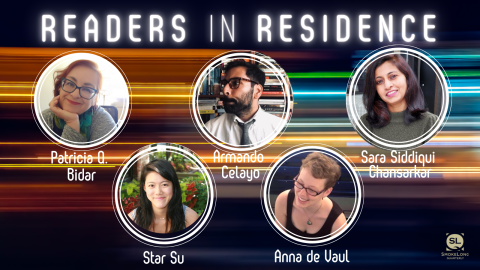
Each quarter we ask experienced writers from the flash community and beyond to join our staff as first readers. They read alongside our submissions editors. For issue 73 we were fortunate to work with Patricia Q. Bidar, Armando Celayo, Sara Siddiqui Chansarkar, Star Su, and Anna De Vaul. Here are a few of their closing comments:
 Reading for SmokeLong has been an invaluable experience for me. After reading the comments from other readers and editors on the submitted stories, I have learned how a story can be seen from different perspectives and evaluated critically for its structure, imagery, or emotion. I am thankful to SmokeLong for this opportunity which would help make my writing better and more meaningful.
Reading for SmokeLong has been an invaluable experience for me. After reading the comments from other readers and editors on the submitted stories, I have learned how a story can be seen from different perspectives and evaluated critically for its structure, imagery, or emotion. I am thankful to SmokeLong for this opportunity which would help make my writing better and more meaningful.
For submitters, I cannot stress enough on the importance of endings in flash fiction. Many stories start strong but fizzle out towards the end, resulting in rejection. Leave the reader with a taste that lingers, an image that refuses to fade, a thought that lodges itself in the brain. And, lastly, please read and follow the guidelines for submission.
—Sara
 What an honor to work as part of a team that read and considered 3,000 works for publication by SmokeLong! It was my pleasure to read every story assigned to me, and my privilege to witness the hard work and wild creativity that went into each.
What an honor to work as part of a team that read and considered 3,000 works for publication by SmokeLong! It was my pleasure to read every story assigned to me, and my privilege to witness the hard work and wild creativity that went into each.
From that perspective I have a few tips…
Did the writing change you? If you don’t feel moved and changed in the writing of your story, neither will the reader.
One thing I noticed a lot was an abundance of skillfully wrought but overlong sentences. Vary sentence length and use active verbs.
The reader almost never needs to know your characters’ eye or hair color and length.It’s unlikely that having your character looking into a mirror adds to your story.
Death is a common theme in literature, to be sure. But make sure you aren’t using death as a sort of shorthand for authentic depth.
Read, read, read. Every journal’s guidelines say this, because it’s true.
But mainly, bear in mind that SmokeLong publishes a tiny percentage of what is submitted to them. The editors must turn down good writing for writing that is truly singular. Is your story one that no one else could have written? That the reader will think about months or years after reading it?
—Patricia.
 I appreciate that reading at SLQ is truly blind; each piece of work is judged solely on its own merits without any knowledge of author or prior publications. As both a writer and an editor, I appreciate how this encourages careful consideration of the story and writing.
I appreciate that reading at SLQ is truly blind; each piece of work is judged solely on its own merits without any knowledge of author or prior publications. As both a writer and an editor, I appreciate how this encourages careful consideration of the story and writing.
It’s been a pleasure to work with a team of editors who are respectful of diversity and who champion and promote diverse voices, styles, and perspectives.
SLQ receives A LOT of submissions, which can make it hard for even a really excellent piece of writing to stand out. The stories that stand out to me have a few things in common. It may seem obvious, but they tend to have a hook, something that grabs the reader’s attention from the start. Sometimes this is in a surprising or shocking phrase or description, but it’s just as likely to be a subtle turn. Flash is a compact form, which can make it challenging to show character development (though that’s part of the fun), but establishing a connection or reaction to the characters is another important element in making a story stand out.
Finally (and this may come from my love of poetry), I think some of the best flash I’ve read, for SLQ or elsewhere, incorporates a turn – a shift in the focus or thought or emotion. This is so often what takes a story from good to truly great. One of the things I love about flash is its use of techniques we often think of as “poetic”, and I think this experience of reading and commenting on and discussing so much flash has really made me reflect on my poetic practice.
—Anna
________________________________
Sara Siddiqui Chansarkar is an Indian American writer. Her work has appeared or is forthcoming in SmokeLong Quarterly, Reflex Press, Flash Fiction Online, and elsewhere. Her work has been highly commended in National Flash Fiction Day Microfiction Competition, earned an honorable mention in Flash Fiction Magazine Editor’s Choice Award, and shortlisted in the SmokeLong Quarterly Grand Micro Contest. She has been nominated multiple times for Pushcart and Best of the Net awards. She is currently an editor at Janus Literary. More at https://saraspunyfingers.com. Reach her @PunyFingers
Patricia Q. Bidar hails from San Pedro, California, with deep family roots in New Mexico, Arizona, and Utah. She is an alum of the UC Davis Graduate Writing Program. Patricia’s stories have appeared in SmokeLong Quarterly, Wigleaf, Sou’wester, Little Patuxent Review, and Pidgeonholes, among other places. Patricia’s work has been nominated for The Pushcart Prize, Best of the Net, Best Small Fictions, and Best Microfiction. When she is not writing fiction, Patricia reads, enjoys nature, and ghostwrites for nonprofit organizations. She lives with her DJ husband and unusual dog in the San Francisco Bay Area. Visit Patricia at www.patriciaqbidar.com or on Twitter (@patriciabidar).
Anna De Vaul writes both poetry and prose. Her first book, Volcano (Unsolicited Press 2019), is a collection-length sequence of poems published under the heteronym Elosham Vog. Her chapbook Cosmonaut is forthcoming in Sept. 2021 with Valley Press. Anna is a winner of Eyewear Publishing’s Fortnight Prize and is a Pushcart Prize (fiction) and Forward Prize (best single poem) nominee. She is a founding editor of the literary journal Lighthouse (UK) and an editor for Nimrod International Journal.

 The core workshop of SmokeLong Fitness is all in writing, so you can take part from anywhere at anytime. We are excited about creating a supportive, consistent and structured environment for flash writers to work on their craft in a community. We are thrilled and proud to say that our workshop participants have won, placed, or been listed in every major flash competition. Community works.
The core workshop of SmokeLong Fitness is all in writing, so you can take part from anywhere at anytime. We are excited about creating a supportive, consistent and structured environment for flash writers to work on their craft in a community. We are thrilled and proud to say that our workshop participants have won, placed, or been listed in every major flash competition. Community works.